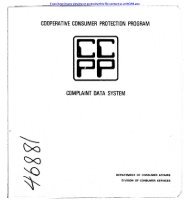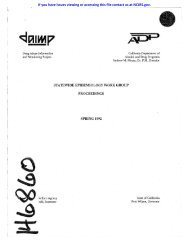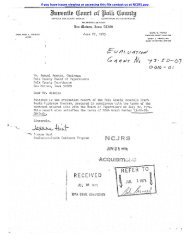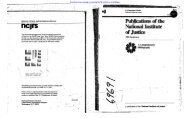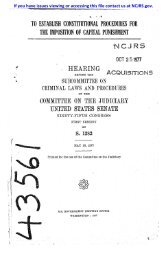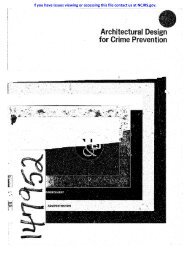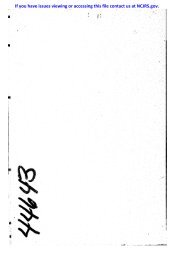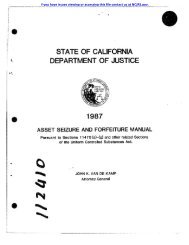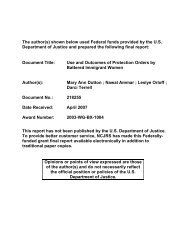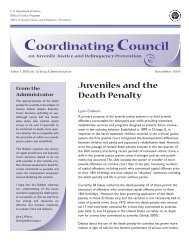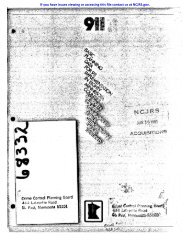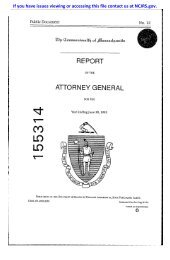- Page 1 and 2: The author(s) shown below used Fede
- Page 3 and 4: Table of Contents Executive Summary
- Page 5 and 6: EXECUTIVE SUMMARY Evaluation of Pri
- Page 7 and 8: e the same five institutions were c
- Page 9 and 10: 0 0 Treatment staff showed a high l
- Page 11 and 12: Policy Issues and Recommendations R
- Page 13 and 14: 1. Overview In fro duction Like oth
- Page 15: a years old. Offenders were serving
- Page 19 and 20: e repeatedly incarcerated, but untr
- Page 21 and 22: 0 According to a recent report by t
- Page 23 and 24: e and Camacho, 1997), and the Feder
- Page 25 and 26: 8% lower reincarceration rate compa
- Page 27 and 28: e reincarcerated, compared to only
- Page 29 and 30: e of less violence and greater drug
- Page 31 and 32: included those clients who graduate
- Page 33 and 34: e conjunction with the National Ins
- Page 35 and 36: @ drug use than untreated women (35
- Page 37 and 38: 9 serve, then they were removed fio
- Page 39 and 40: programming per week (mean = 30 hr/
- Page 41 and 42: participation in treatment) and pos
- Page 43 and 44: 1990; Bonta, 1996; Jones, 1996). Th
- Page 45 and 46: Admission and Classification. 1 I I
- Page 47 and 48: e or both’*. TC clients were aske
- Page 49 and 50: e Post-release indicators focused u
- Page 51 and 52: a Independent Variables One excelle
- Page 53 and 54: state prison system. The test-retes
- Page 55 and 56: e high correlation with the Beck De
- Page 57 and 58: The social conformity scale has dis
- Page 59 and 60: e (Simpson, 1997). Items assess the
- Page 61 and 62: @ Sample Characteristics For each i
- Page 63 and 64: ~~ 0 inmates participated in AOD pr
- Page 65 and 66: ~ ~~ a Table 5 Treatment Exposure:
- Page 67 and 68:
Inmates in the four program types d
- Page 69 and 70:
dichotomous outcomes such as reinca
- Page 71 and 72:
We also observed statkg ratios (inm
- Page 73 and 74:
e until they are mandated to go, so
- Page 75 and 76:
a Table 8 Inmate Characteristics bv
- Page 77 and 78:
more counselors and that the progra
- Page 79 and 80:
Waymart. Inmates attend a morning m
- Page 81 and 82:
current TC inmates (REST and CRC fo
- Page 83 and 84:
~ ~~~~ e However, a number of inmat
- Page 85 and 86:
e Counselor ratings of client attri
- Page 87 and 88:
@ process across the five programs,
- Page 89 and 90:
Table 10 Mean CRC Scores: Time 1, T
- Page 91 and 92:
Table 12 Mean CRC Scores: Paired Sa
- Page 93 and 94:
Table 14 ChanPes in Ratings of Trea
- Page 95 and 96:
DOC custody for a parole violation,
- Page 97 and 98:
0 Table 15 Number and Type of Relea
- Page 99 and 100:
Because few inmates had been releas
- Page 101 and 102:
0 Table 16 Reincarceration SamDle C
- Page 103 and 104:
0 Table 18 Lopistic Repression of R
- Page 105 and 106:
Table 19 Survival Analvsis: Life Ta
- Page 107 and 108:
Rearrests Rearrest analyses were ba
- Page 109 and 110:
Table20 ~~~ Rearrest Sample Charact
- Page 111 and 112:
Table 22 LoPistic Repression of Rea
- Page 113 and 114:
Table 23 Survival Analvsis: Life Ta
- Page 115 and 116:
e Drug Relapse and Other Parole Dat
- Page 117 and 118:
successfill discharges only), the e
- Page 119 and 120:
treatment, psychological hctioning)
- Page 121 and 122:
Table 25 Logistic Repression of Dru
- Page 123 and 124:
i Comparison Group TC Group Note. E
- Page 125 and 126:
c 0 E 40% icr E Cresson Graterford
- Page 127 and 128:
Hazard Function V C comparison grou
- Page 129 and 130:
For each of the three dependent var
- Page 131 and 132:
V. CONCLUSIONS AND RECOMMENDATIONS
- Page 133 and 134:
Employment may help prevent drug re
- Page 135 and 136:
group did get some treatment help
- Page 137 and 138:
Recommendations: 2. Correctional ad
- Page 139 and 140:
an inmate gets closer to hisher min
- Page 141 and 142:
Findings suggested that certain inm
- Page 143 and 144:
e Finding: TC programs varied littl
- Page 145 and 146:
an evaluation study can be linked w
- Page 147 and 148:
and Ryder, 2001; Travis and Petersi
- Page 149 and 150:
References Andrews, Donald A. (1995
- Page 151 and 152:
Derogatis, L.R., H. Yevzeroff, and
- Page 153 and 154:
Hiller, Matthew L.; Knight, Kevin,
- Page 155 and 156:
the Physician Leadership on Nationa
- Page 157 and 158:
Palmer, Ted. (1995) "Programmatic a
- Page 159 and 160:
Simpson, D. Dwayne (1994) TCUPTA Fo
- Page 161 and 162:
U.S. Department of Justice (1998) S
- Page 163 and 164:
Criminal Justice. U.S. GPO. No. 198
- Page 165 and 166:
Appendix I. Overview of DOC Databas
- Page 167 and 168:
INMATE RECORDS SYSTEM This database
- Page 169 and 170:
Inmate (Program Participant) Interv
- Page 171 and 172:
' Appendix 3. Subject Consent Form
- Page 173 and 174:
Confidentiali@/Anonymitv I understa
- Page 175 and 176:
DRUG SCREEN PLEASE COMPLETE ALL INF
- Page 177 and 178:
@ Appendix 5. TCU Resident Evaluati
- Page 179 and 180:
EVALUATION OF SELF AND TIiEATMENT (
- Page 181 and 182:
EVALUATION OF SELF AND TREATMENT (C
- Page 183 and 184:
EVALUATION OF SELF AND TREATMENT (C
- Page 185 and 186:
Appendix 6. TCU Counselor Rating of
- Page 187 and 188:
COUNSELOR RATING OF CLIENT (CONTINU
- Page 189 and 190:
@ INDIVIDUAL PROGRAM REPORTS: DOC-T
- Page 191 and 192:
pattern, chemical abuse and health
- Page 193 and 194:
~ on the inmate with respect to pre
- Page 195 and 196:
1. Presence of AOD problem that has
- Page 197 and 198:
@ and consists of suggestions on ho
- Page 199 and 200:
0 tasks, the inmate must receive a
- Page 201 and 202:
StaffDemographics (fidl time AOD st
- Page 203 and 204:
@ provided describing drug and alco
- Page 205 and 206:
The Inmate Handbook also lists reas
- Page 207 and 208:
Examples of Phase I1 problem areas
- Page 209 and 210:
counselor and through institutional
- Page 211 and 212:
9. What are the criteria for succes
- Page 213 and 214:
and then listing an alternative ass
- Page 215 and 216:
Finally, in Phase IV the inmate is
- Page 217 and 218:
INDIVIDUAL PROGRAM REPORTS: DOC-TEM
- Page 219 and 220:
Specific Program Content and Struct
- Page 221:
Name of Staff Member: Job Title: Hi



